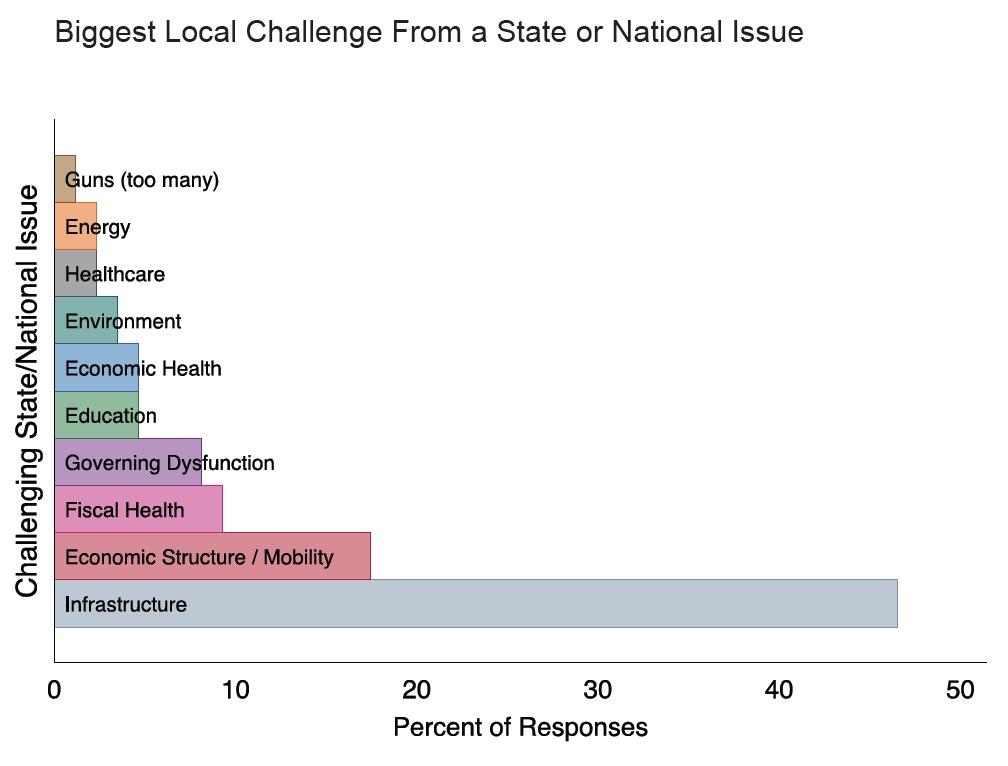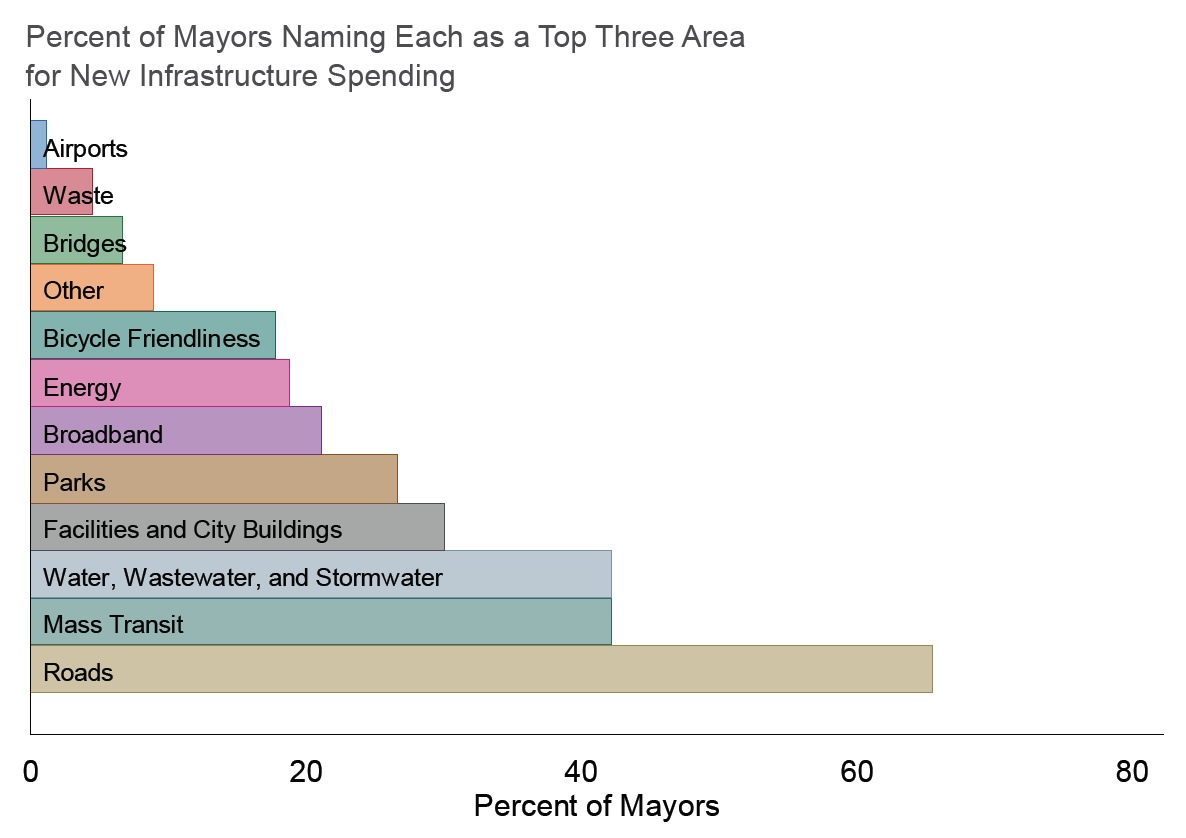BOSTON UNIVERSITY
INITIATIVE ON CITIES
Executive Summary
The 2015 Menino Survey of Mayors encompasses insights and perspectives shared by a representative sample of 89 sitting U.S. mayors from cities of all sizes. In 2014, we discovered that America’s mayors are chiefly concerned with the physical, fiscal, and social infrastructure of their cities. In year two of the Survey, our team delved deeper into these issues, examining specific views mayors harbor with regard to infrastructure, inequality and poverty, public safety, municipal finance, as well as their relationships with constituents and other local actors, other cities, and higher levels of government.
Our objective was to take mayors’ “pulse” on key contemporary challenges and identify where they turn for help in tackling them.
INFRASTRUCTURE: Aging and underfunded physical infrastructure weighs most heavily on the mind of mayors, who identify it as the most pressing challenge they face. Their list of needs is long, but specific “big ticket” priorities include mass transit, roads, and water, wastewater and stormwater infrastructure. While mayors most often must partner with state and federal government to address these priorities, they express limited confidence in the ability of either to adequately help them solve their challenges. When asked to name more modestly priced infrastructure priorities, bike and pedestrian infrastructure and parks were the most frequently cited, followed by roads and municipal buildings.
BIKING: Mayors express strong support for bike-friendly policies, in addition to naming them as infrastructure funding priorities. 70 percent of mayors support improved bike accessibility, even at the expense of parking and driving lanes. Democratic and Republican mayors do differ in their level of support, with 44 percent of Republican mayors and 81 percent of Democratic ones endorsing improved accessibility, although this may be a reflection of the characteristics of the cities they govern rather than any ideological differences.
POLICING: Mayors broadly support police reforms recently advocated by the President’s Task Force on 21st Century Policing and others, but express important reservations about some policies, including those they support in principle. Mayors overwhelmingly support an array of proposed police reforms, including body cameras, independent investigations for all police related shootings, publicizing arrest and crime statistics by demographics, evaluating police departments based on arrest and crime statistics, and civilian review boards. What’s more, this strong support persists across partisan lines with Democratic and Republican mayors evincing no differences in their support for police reform. However, as one mayor noted, “the devil’s in the details” and mayors want to ensure that they’re protecting individual rights and privacy as well as promoting fairness.
POVERTY AND INEQUALITY: Cities, especially big cities, are aggressively pursuing a wide variety of policies targeting the challenges faced by low-income residents. Programs targeting the lack of job training/workforce development, high housing costs, limited access to healthy foods, limited access to government social and emergency assistance programs, and limited access to living wage jobs are especially popular. By comparison, fewer cities appear to be tackling challenges related to financial services like limited access to checking and savings accounts and predatory lending. In general, bigger cities are particularly likely to implement policies targeting resident poverty. In the context of so many aggressive efforts to support those in the lowest income brackets, it is also striking to discover that mayors place economic inequality low on their priority list relative to other issues. They believe inequality is an area over which they have limited control and one in which their constituents do not hold them accountable.
HOUSING: Mayors are conflicted about affordable housing mandates and exhibit significant partisan differences in their views about these policies. Mayors were asked about their support for affordable housing requirements, even at the risk of deterring some new development. Democratic mayors were more likely to agree with the implementation of these types of mandates, even if they stymied new development, although their level of support was still modest. Almost 50 percent supported the tradeoff, compared with 20 percent of Republican mayors. Mayors of more affluent cities— where housing needs tend to be a hot button issue—are more inclined than mayors of less prosperous communities to support affordable housing. It is important to note that, in response to a question about support for low income residents, more than half of surveyed mayors report they are “aggressively addressing” high housing costs in their city.
…
I. INFRASTRUCTURE INVESTMENT: AN URGENT PRIORITY
Mayors overwhelmingly believe that physical infrastructure is one of the greatest challenges facing their city. Mayors were asked to identify the greatest challenge they face which falls outside their control—in other words, a challenge that is typically the purview of other levels of government. “Think about the next five years and beyond. What ONE trend or issue that you primarily think should be a state and/or federal matter will pose the biggest challenge to your city?” Importantly, this question did not query mayors about challenges to their cities generally, which was explored in last year’s report.
Almost half of mayors selected infrastructure, which is a striking level of accord for an open-ended question. Nearly all of those who referenced infrastructure focused on a lack of funding for upkeep and improvements. As one mayor noted “The lack of spending on infrastructure is a failure at the local, state, and federal levels.”5 Figure 1 displays the proportion of responses that fell into each category.
Still, many mayors had other priorities. Thus, although a large portion of mayors believe that infrastructure is the chief state/ federal issue to fall onto their desks, a sizable number of other issues also worry them.
Figure 1: Thinking about the next five years and beyond. What ONE trend or issue that you primarily think should be a state and/or federal matter will pose the biggest challenge to your city? Or do no such issues stand out?
Mayors don’t expect other levels of government to come to their rescue. When asked to rate their confidence in their state and federal governments’ ability to mitigate the challenge they chose, mayors almost universally lack confidence in them. On a scale from “not at all confident” to “very confident,” mayors’ mean response indicated they’re “not confident” in either entity.6 Skepticism about state and federal government is equally prevalent among Democrats and Republicans. Irrespective of party, mayors’ average responses were the same. This consistency holds for those who chose infrastructure and those who selected other challenges.
Mayors believe they’re judged by constituents on the quality of local infrastructure, suggesting this is as much of a political issue as an economic and quality of life concern. Mayors were asked to rate a number of concerns that drive constituents’ approval of their performance as mayor. Infrastructure was, on average, at the top of the list alongside city services and crime. (Full results and further discussion are in and around Figure 19.)
In contrast to their lack of faith in others, mayors are cautiously confident in their own city’s ability, believing they’re “somewhat equipped” to tackle the problems they named. As former Washington, DC Mayor Anthony Williams once remarked in a discussion on ailing urban infrastructure, “If the stagecoach isn’t coming, you’ve got to start walking. Mayors can’t wait.”7 Indeed, infrastructure was an area over which the average mayor believed that s/he exercises a great deal of control. (Figure 20)
Similarly, mayors appear to be somewhat optimistic about the “extent [to which] local public-private partnerships [can] substitute for state and/or federal support” with the mean response indicating that these partnerships can substitute “some.”8 But as one big city mayor noted, they’re no panacea. “Public private-partnerships are great if you want something built with somebody else’s up front capital. But you still have to pay the bill…. There are limited areas in which public-private partnerships can work, but they’re not a solution to everything.”
Specific “Big Ticket” Infrastructure Priorities
Mayors list roads, mass transit, and water, wastewater, and stormwater as their top three priorities for new infrastructure investment. In his address to mayors at the 2015 USCM meeting, President Obama observed, “There’s not a mayor here who can’t reel off 10 infrastructure projects right now that you’d love to get funding for, and that would put people to work right away and improve your competitiveness, and help businesses move their products and help people get to their jobs.“9 This survey provides those lists, identifying mayors’ infrastructure priorities both large and small.
Mayors were asked three constrained questions about their infrastructure priorities, in an effort to force them to make tough choices comparable to those they must make in real life.
Mayors were asked a closed-ended question about infrastructure priorities: “Thinking about infrastructure in and around your city, what are the top three areas you would prioritize if you could allocate a significant amount of new money?” Potential responses included an extensive list of possibilities, including roads; bridges; mass transit; water, wastewater, and stormwater; energy; bicycle friendliness; broadband; waste; facilities and city buildings; parks; airports; and other. Figure 2 displays the proportion of mayors naming each of these policy areas as a top three priority for new infrastructure spending.
Figure 2: Thinking about infrastructure in and around your city, what are the top three areas you would prioritize if you could allocate a significant amount of new money?
Download full version (PDF): 2015 Menino Survey of Mayors
About the Boston University Initiative on Cities
www.bu.edu/ioc
The Initiative on Cities at Boston University seeks to research, promote, and advance the adaptive urban leadership strategies and policies necessary to support cities as dynamic centers of economic growth and positive development in the 21st century. Founded by a proven urban leader, the late former Boston Mayor Thomas M. Menino, and a highly regarded academic, Professor Graham Wilson, the Initiative serves as a bridge between world-class academic research and the real-life practice of city governance.
Tags: Boston University Initiative on Cities, BU, IOC, Mayors, survey








 RSS Feed
RSS Feed